Reading What to Expect When You’re Expecting is a rite of passage for soon-to-be parents. I saw one estimate that over 90 percent of people who read a pregnancy book have read that one. So Sarah and I were thrilled to welcome Heidi Murkoff, author of the series, to Best of Both Worlds this week.
Heidi was looking for baby advice when she was expecting her first child. Then she realized that very few books about pregnancy had been written by people who had actually been pregnant themselves. So she decided to meet that need. Over the past four decades, her books have helped millions of people understand childbearing and childrearing.
In this episode, she talks with Sarah about her famous guide, and then about her current mission to advocate for maternal and child health.
We end with a question from a listener about how to find summer camps that can actually function as childcare. Please give the episode a listen and let us know if you read What to Expect When You’re Expecting when you were expecting!


I sure did! It felt like a rite of passage.
And then I read What to Expect the First Year…and we always joked that our daughter was the asterisk in that book. Everything the book told us she would do…she didn’t. Haha!
I did not read this book! I feel like the outlier, though. Instead I read “Expecting Better” by Emily Oster which I loved. I also read “The Science of Mom” which examined the various decisions you make around childbirth/during the first year.
This was an interesting interview, though. I loved hearing how she is helping military family and those in underserved populations like refugee camps.
Hi Laura,
I was a bit surprised at your somewhat dismissive tone towards parenting books at the beginning of the episode. I agree with the fact that having a desire to improve your parenting (and perhaps reading a book about it) probably means you’re already trying hard and doing the best you can, but I do feel like so many parenting books have given me concrete things that have helped our homelife. As someone who writes in the self-help genre, how do you differentiate parenting books in your mind from books like your own? Not trying to be antagonistic, just found it curious!
@Heather – yes, my beef is that the people who are, in general, reading parenting books are in fact trying very hard and hoping to do a good job. If a tip works, that’s great — and I think any self-help book should be approached from that spirit. I’m going to find a few useful tips I want to try, understanding that few things work for everyone. I just also see, with five kids, that some stuff that “worked” on one kid doesn’t “work” at all on another. It’s not that I was a better parent with one than the other it’s just that kids are different.